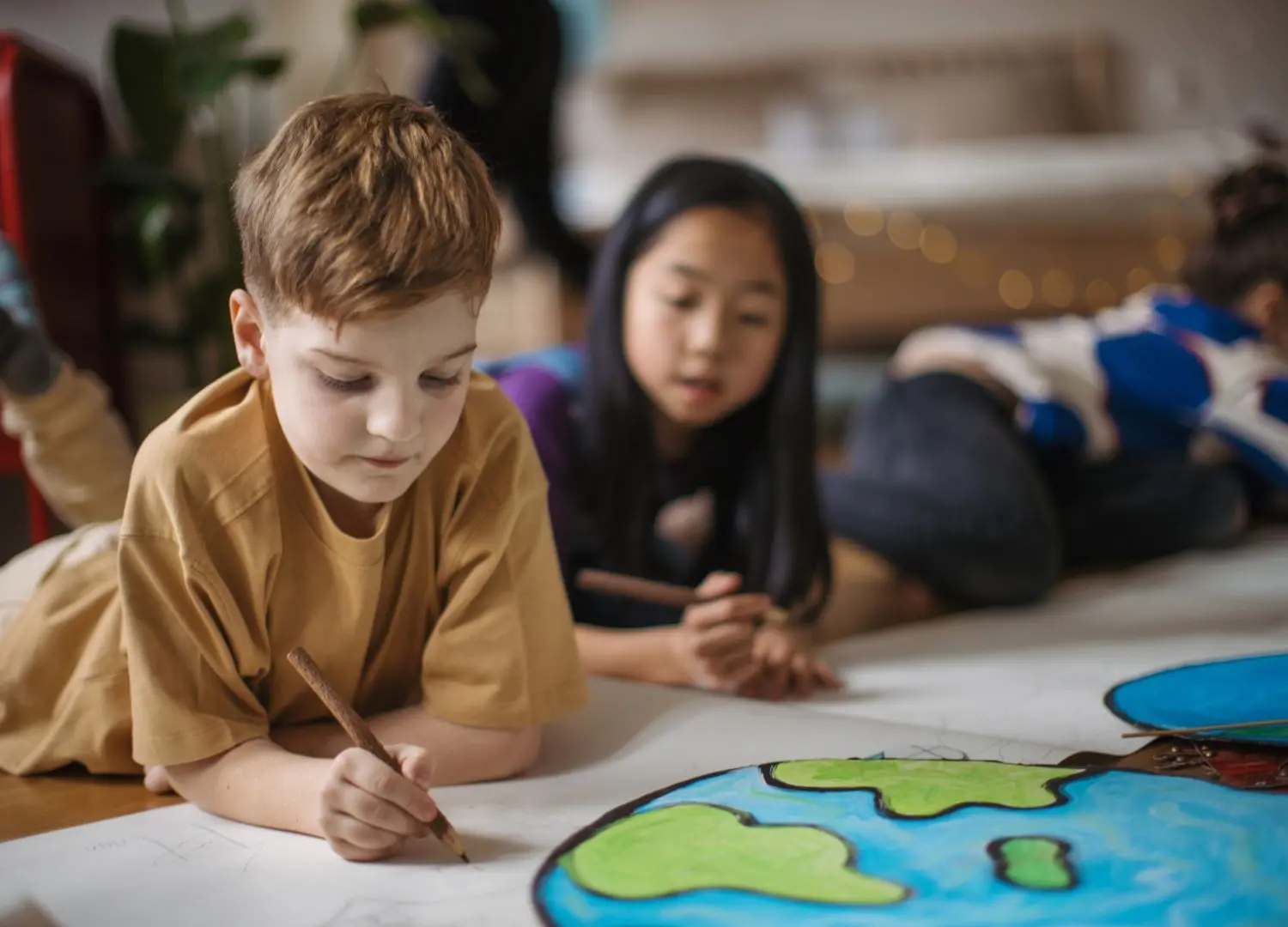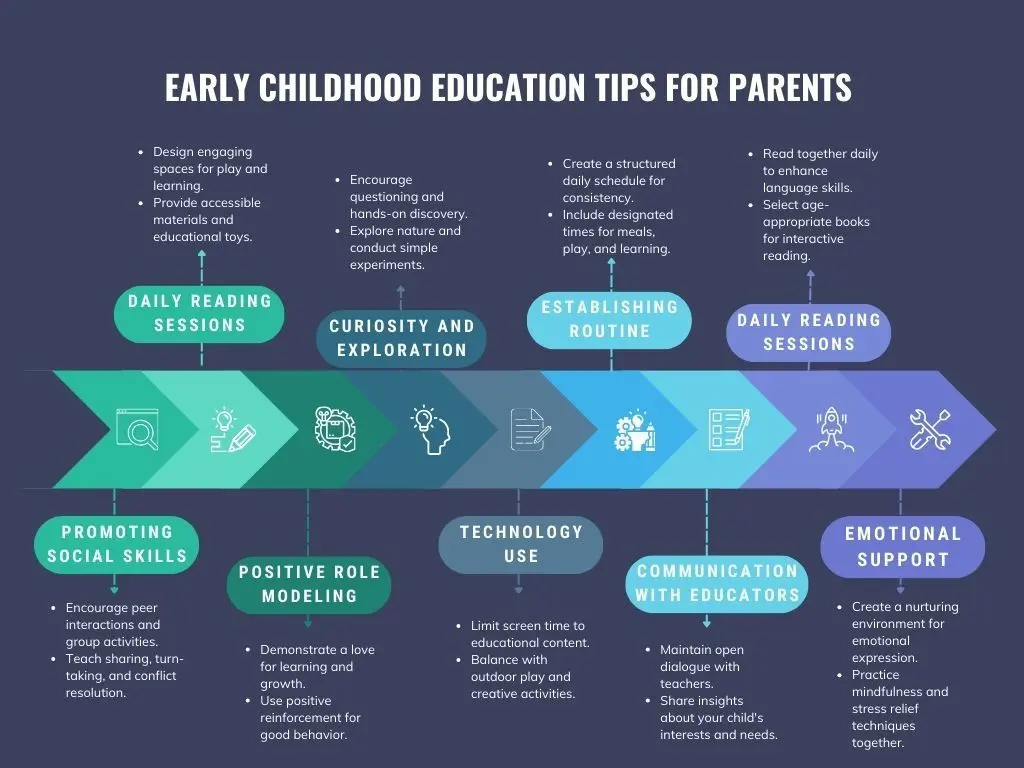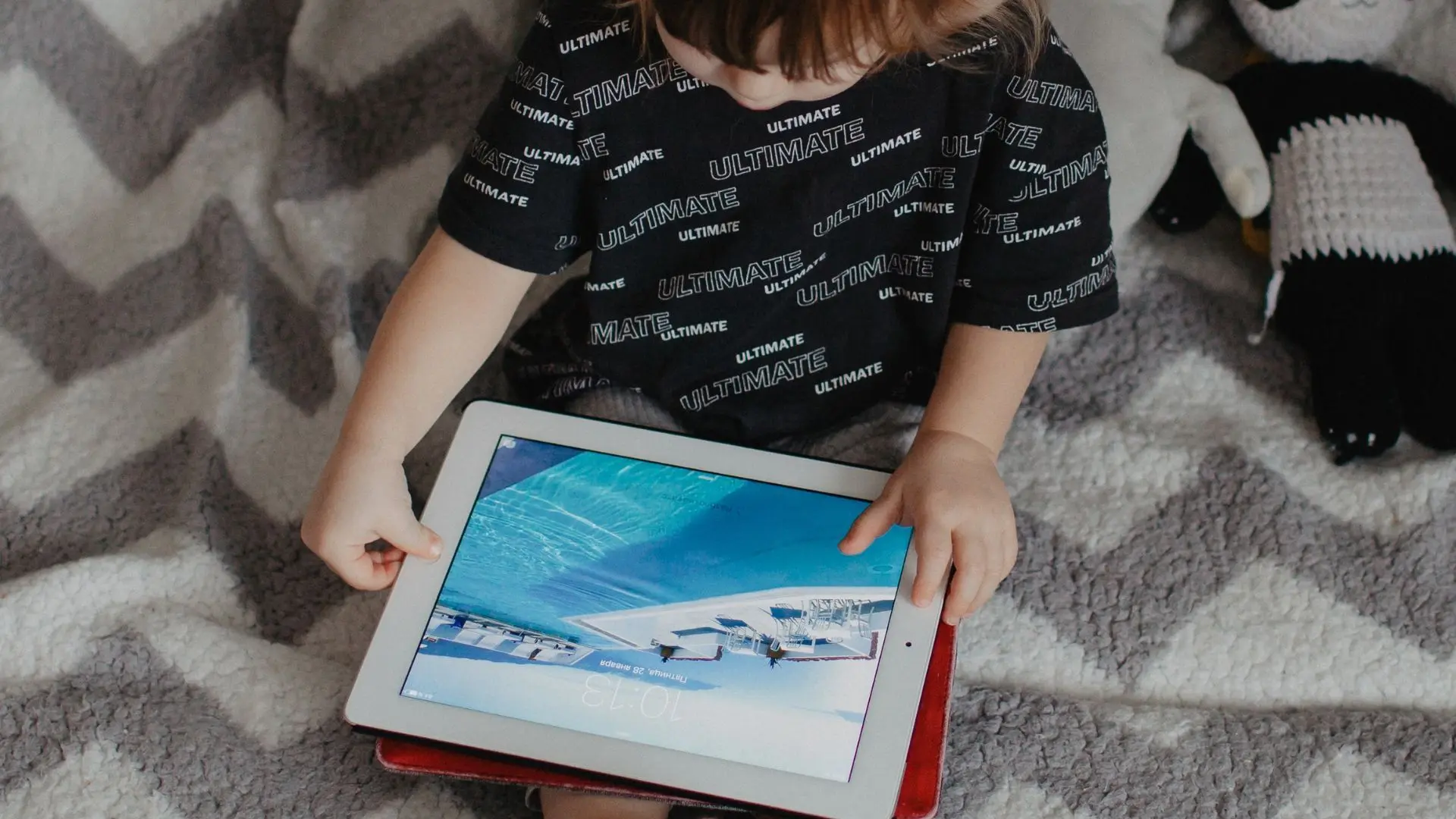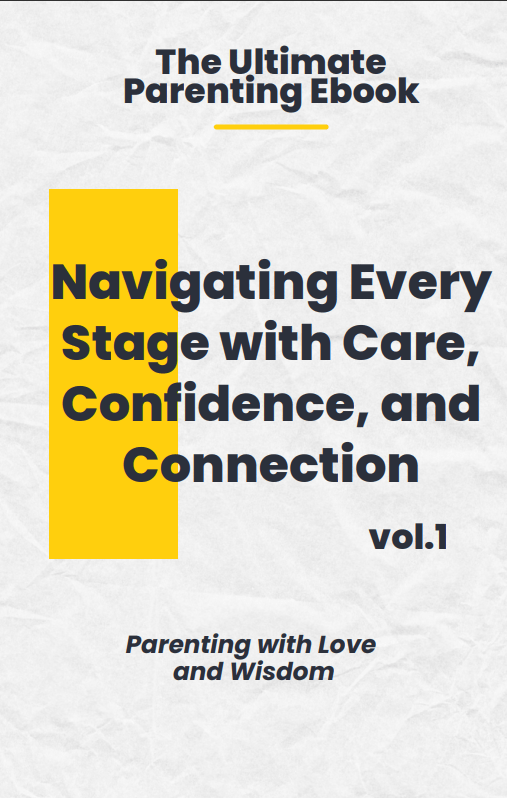Open the door to endless possibilities in Early Childhood Education. Our expert tips for parents promise to spark joy and curiosity in your child’s learning journey.

Early childhood education is crucial, with studies showing that children who attend high-quality early education programs are 20% more likely to graduate high school. For parents, understanding the value of early childhood education can shape your child’s future, fostering cognitive, social, and emotional development.
This post will explore best practices in early childhood education, providing tips tailored for parents. By engaging in your child’s early education, you’re not just preparing them for school, but for a lifetime of success. Dive into these insights to ensure your child gets the best start possible in their educational journey.
In This Blog
ToggleWhy Early Childhood Education Matters
Early childhood education is paramount in shaping a child’s developmental trajectory, fostering a strong foundation for future learning and success. Early childhood education encompasses the period from birth to eight years old. It provides young learners with essential skills and experiences that serve as building blocks for their academic and social growth.
Experts emphasize that the early years are a critical period for brain development, with experiences during this time significantly impacting a child’s cognitive abilities and social-emotional skills.
By actively engaging in your child’s education, you lay a strong foundation for their future. Remember, early childhood education is not just about what happens in the classroom but also about the rich learning experiences you provide at home.
Here Are Some Useful Tips for Parents

1. Create a Stimulating Learning Environment
A safe and engaging learning environment at home is crucial for your child’s early development. Start by creating spaces that encourage exploration and play. This could be a cozy reading nook, a craft corner, or a backyard garden.

Ensure that these spaces are child-friendly, with accessible materials that spark curiosity. Incorporate educational toys and activities that promote learning through play. For example, building blocks can enhance fine motor skills and spatial awareness, while puzzles can improve problem-solving abilities.
A stimulating environment fosters a love for learning and helps your child develop critical thinking skills. Remember, early childhood education thrives in a well-prepared and supportive environment.
2. Encourage Curiosity and Exploration
Children possess an innate curiosity, and fostering this quality through early education is vital. Encourage your child to ask questions and investigate their environment. Simple activities like taking a nature walk and talking about the various plants and animals you see can be very effective.

Provide hands-on activities that allow your child to experiment and discover. For instance, you can conduct simple science experiments at home, like mixing baking soda and vinegar to observe the reaction.
By fostering an environment of curiosity, you help your child develop a lifelong love for learning. Remember, early childhood education is about encouraging exploration and discovery.
3. Establish a Routine
Consistency is key in early childhood education. Establishing a daily routine helps your child feel secure and understand what to expect throughout the day. A structured routine can include specific times for meals, play, learning activities, and bedtime.
For example, you might start the day with breakfast, followed by a morning reading session, playtime, lunch, nap, and afternoon activities. Routines provide a sense of stability and help children develop self-discipline and time-management skills.

Consistent routines are also beneficial for parents, as they create a predictable schedule that can reduce stress and enhance the overall learning experience.
4. Read Together Daily
Reading with your child every day is one of the most effective ways to support early childhood education. Daily reading sessions enhance vocabulary, improve language skills, and foster a love for books. Choose a variety of age-appropriate books that cater to your child’s interests.
For example, picture books with colorful illustrations can captivate young minds, while storybooks with engaging plots can stimulate imagination. Make reading a fun and interactive experience by asking questions about the story and encouraging your child to predict what happens next.

By incorporating reading into your daily routine, you significantly contribute to your child’s early childhood education and overall development.
5. Promote Social Skills
Developing social skills is a crucial aspect of early childhood education. Encourage your child to interact with peers through playdates and group activities. These interactions help children learn how to share, take turns, and resolve conflicts.
For example, arranging a weekly playdate with neighbors or participating in community events can provide opportunities for socialization. Enroll your child in group activities like music classes or sports teams to further enhance their social skills.

Early childhood education focuses on holistic development, and social skills are an integral part of this process. By promoting social interactions, you help your child build confidence and develop meaningful relationships.
6. Be a Role Model
Children learn by observing their parents, making it essential to be a positive role model. Demonstrate a love for learning by engaging in educational activities yourself. For instance, if your child sees you reading books or pursuing hobbies, they are more likely to imitate these behaviors.

Use positive reinforcement to encourage good behavior and learning efforts. Praise your child for their achievements, no matter how small, and offer constructive feedback when needed.
By setting a positive example, you reinforce the importance of early childhood education and inspire your child to adopt a growth mindset. Remember, your actions speak louder than words.
7. Use Technology Wisely
In the contemporary digital era, technology greatly impacts early childhood education. However, it is essential to utilize technology judiciously and in moderation. Limiting screen time and ensuring that the content children engage with is educational and suitable for their age is crucial.

There are many high-quality educational apps and games available that can enhance learning. For example, apps that teach letters, numbers, and shapes can be beneficial for preschoolers. Balance screen time with other activities like outdoor play, reading, and creative projects.
By using technology thoughtfully, you can leverage its benefits while maintaining a well-rounded approach to early childhood education.
8. Communicate with Educators
Building a strong partnership with your child’s teachers is vital for supporting early childhood education. Maintain open lines of communication and stay informed about your child’s progress and any areas that need attention.

Attend parent-teacher conferences and actively participate in school events. Share insights about your child’s interests and learning style with educators to help them tailor their teaching approaches.
Collaborating with teachers ensures a cohesive learning experience and reinforces the importance of education both at home and in school. Remember, early childhood education is a team effort, and your involvement is crucial for your child’s success.
9. Support Emotional Development
Emotional development is a fundamental component of early childhood education. Help your child understand and manage their emotions by providing a supportive and nurturing environment. Teach them about emotional intelligence by discussing feelings and modeling healthy emotional expression.
For example, you can use storybooks that explore different emotions and discuss how characters handle various situations. Practice mindfulness and stress relief techniques with your child, such as deep breathing exercises or quiet time.

Supporting your child’s emotional development helps them build resilience, empathy, and self-awareness, which are essential skills for lifelong success.
Conclusion
In conclusion, early childhood education is a multi-faceted journey that involves creating a stimulating environment, fostering curiosity, and establishing routines. By reading together daily, promoting social skills, and being a positive role model, you can significantly impact your child’s development.
Using technology wisely, communicating with educators, and supporting emotional growth further enhance the learning experience. Remember, your involvement and dedication as a parent are crucial in shaping your child’s future.
By following these tips, you can provide a strong foundation for your child’s early childhood education and set them on the path to success.
On this journey of early childhood education with your child, we invite you to share your experiences and tips in the comments below. Your insights can inspire and support other parents on the same path.
Additionally, explore our recommended resources for further reading on early childhood education, and stay connected with us for more expert advice and practical tips.
You may also be interested in : How Old is a Toddler? Track Average Weight, Growth Chart & Development Milestones
FAQs
1. What is early childhood education, and why is it important?
Early childhood education refers to the period from birth to eight years old, focusing on holistic development—cognitive, emotional, social, and physical. It’s crucial because these formative years shape future academic success, social skills, and overall well-being. Quality early education lays a strong foundation for lifelong learning and development.
2. How can I create a stimulating learning environment at home?
Create spaces that encourage exploration and play, like a reading nook or craft corner. Use educational toys and activities that promote learning through play, such as building blocks or puzzles. Ensure the environment is safe, accessible, and filled with materials that spark curiosity and creativity.
3. How can I encourage my child’s curiosity?
Encourage your child to ask questions and explore their surroundings. Engage in hands-on activities like nature walks or simple science experiments at home. Provide opportunities for discovery and learning through play, which fosters a love for learning and critical thinking skills.
4. What are some effective ways to establish a routine for my child?
Create a structured daily schedule that includes specific times for meals, play, learning activities, and bedtime. Consistency provides stability and helps children develop self-discipline and time management skills. A predictable routine also reduces stress for both children and parents.
5. Why is reading together daily important for early childhood education?
Daily reading sessions enhance vocabulary, language skills, and a love for books. Choose age-appropriate and engaging books, and make reading interactive by asking questions and discussing the story. Regular reading significantly contributes to your child’s cognitive and emotional development.
6. How can I promote social skills in my child?
Encourage interactions with peers through playdates and group activities like music classes or sports. These experiences teach sharing, taking turns, and resolving conflicts. Social skills are crucial for building confidence and meaningful relationships, contributing to overall development.
7. What role does technology play in early childhood education?
Technology can enhance learning when used wisely and in moderation. Limit screen time and ensure content is educational and age-appropriate. Use high-quality educational apps and games, and balance screen time with other activities like outdoor play, reading, and creative projects.
8. How can I effectively communicate with my child’s educators?
Maintain open communication with your child’s teachers to stay informed about their progress. Attend parent-teacher conferences and school events. Share insights about your child’s interests and learning style to help educators tailor their teaching approaches, ensuring a cohesive learning experience.
9. How can I support my child’s emotional development?
Provide a supportive environment where your child can understand and manage their emotions. Teach emotional intelligence by discussing feelings and modeling healthy emotional expression. Use storybooks and mindfulness techniques like deep breathing exercises to help your child build resilience and empathy.
10. What are the long-term benefits of early childhood education?
Early childhood education provides a strong foundation for lifelong learning and development. It enhances cognitive, social, and emotional skills, leading to better academic performance, improved social interactions, and overall well-being. Investing in early education sets children on a path to future success.




